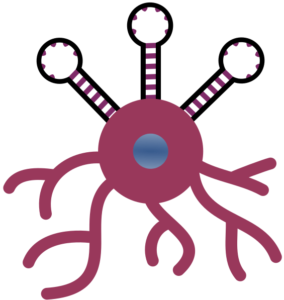RNA- NEURO


Title of Poject
Systems Analysis of novel small non-coding RNA in neuronal stress responses: towards novel biomarkers and therapeutics for neurodegenerative disorders- RNA-NEURO
Motor neuron disease, frontotemporal dementia and Parkinson’s disease are disorders that lead to the death of nerve cells. We aim to identify the disease specific ‘fingerprint’ of a new class of molecules that are linked to stress responses in nerve cells, ‘small non-coding RNAs’. These can be detected in various fluids, including blood. We aim to identify whether detecting them in blood helps in patient diagnosis and provides information whether the disease will progress fast or slowly. This is important information for doctors and patients alike. Finally, we will explore their potential as therapeutics, as they may boost defense mechanisms.
The RNA-NEURO consortium consists of a team of specialist researchers in Denmark, Germany, Ireland, Italy, Canada, and The Netherlands. RNA-NEURO has recognised the importance of identifying common pathways involved in the neurodegenerative disorders. However, the underlying mechanisms of disease progression remain poorly understood. Efforts at elucidating the genes involved in the progression of these disorders have failed to encompass all of their complexity and variability so far.
Small non-coding RNAs remain understudied in the field of neurodegenerative disease. Recent research has shown these molecules play a critical role in regulating gene expression in the nervous system. Small non-coding RNAs have also been found to significantly impact gene regulation in neurodegenerative disorders.
RNA-NEURO’s mission is to reveal the role of small non-coding RNAs in Parkinson’s disease, amyotrophic lateral sclerosis, and frontotemporal dementia, with a view to creating novel therapeutic strategies to treat these disorders.
We therefore aim to investigate whether such molecules also provide information regarding disease progression, which is important information for doctors and patients alike. Finally, we will explore the function of these small non-coding RNAs, with the ultimate aim to employ these as novel therapeutics, as they may boost defense mechanisms in nerve cells.
List of Collobaroators
Ireland
Prof Jochen HM Prehn, (Partner 1, Coordinator)
Denmark
Prof Jørgen Kjems, Aarhus University/Interdiscipl. Nanoscience Ctr (Partner 2)
Netherlands
Dr Michael van Es, Department of Neurology & Neurosurgery, Brain Center Rudolf Magnus, University Medical Center Utrecht, (Partner 3)
Italy
Dr Giovanni Nardo, IRCCS-Istituto di Ricerche Farmacologiche Mario Negri, Milan, (Partner 4)
Canada
Prof Ruth Slack, Brain & Mind Research Institute, University of Ottawa
Germany
Prof Mark Helm, Institute of Pharmacy and Biochemistry, Johannes Gutenberg-Universität Mainz (Partner 6)
More information can be found at www.rna-neuro.com
Publication (s)
Acta Pharmacol Sin. 2020 Apr;41(4):442-446. Epub 2020 Mar 6. Angiogenin and tRNA fragments in Parkinson’s disease and neurodegeneration. Prehn JHM1, Jirström E2. doi: 10.1038/s41401-020-0375-9.
.
JPND and NIA/NIH CALL ON COMMON MECHANISMS AND INTERACTIONS AMONG
NEURODEGENERATIVE DISEASES
This grant is an administrative supplement to both pre-existing grants (Gladstone group grant and RNA-NEURO grant) intended to bridge research between tRNA-derived fragments and the autophagy-lysosomal pathway in neurodegeneration.
Title:
Control of neuronal proteostasis by stress-induced transfer RNA fragments (‘tiRNA’) as a common stress pathway across neurodegenerative disorders
- To identify tiRNA/sncRNA fingerprints in AD, ALS, FTD and PD human disease i-neurons
- To determine if tiRNA affect the survival of i-neurons from control and ALS, PD and FTD models
The results of the proposed studies may provide an entirely new understanding of the role of tiRNAs and the control of neuronal proteastasis in neurodegenerative disease. tiRNAs are stable and secreted from cells during stress responses that may provide useful biomarkers for different neurodegenerative diseases.